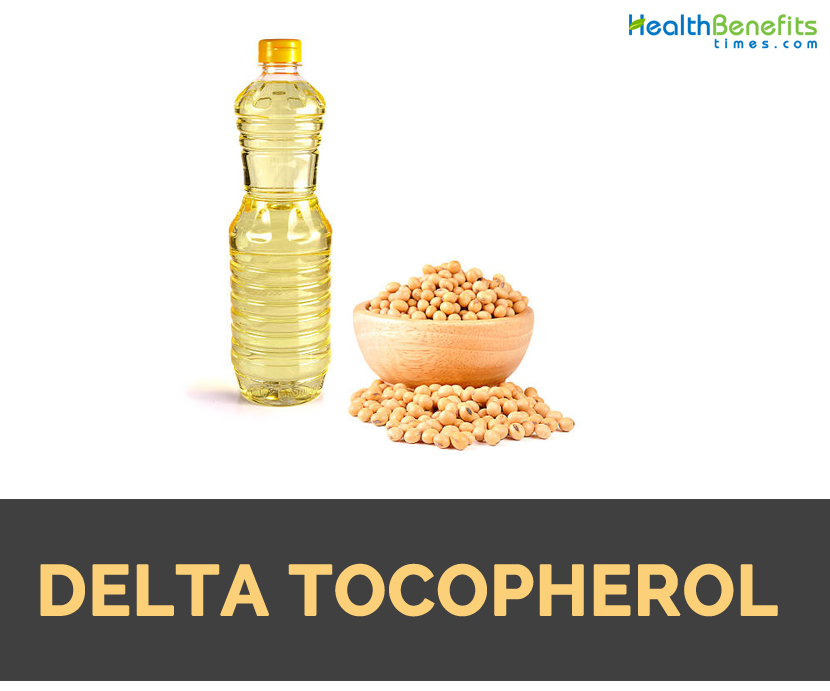 Delta Tocopherol is a chemical compound which is considered Vitamin E. It has E number E309 as a food additive. It is used as an antioxidant in fatty products especially added for preventing rancidity of olive oil. It is bio-available form of naturally occurring fat soluble Vitamin E. In non-biological matter, this Vitamin E is regarded as effective antioxidant among all tocopherols. It is able to eliminate free radicals by protecting cells against oxidative damage. Delta-tocopherol could be produced commercially from maize, cottonseed, soyabean oil, rice germ, green leaves and wheat germ. It may be derived from genetically modified sources. It has C27H46O2 as molecular formula.
Delta Tocopherol is a chemical compound which is considered Vitamin E. It has E number E309 as a food additive. It is used as an antioxidant in fatty products especially added for preventing rancidity of olive oil. It is bio-available form of naturally occurring fat soluble Vitamin E. In non-biological matter, this Vitamin E is regarded as effective antioxidant among all tocopherols. It is able to eliminate free radicals by protecting cells against oxidative damage. Delta-tocopherol could be produced commercially from maize, cottonseed, soyabean oil, rice germ, green leaves and wheat germ. It may be derived from genetically modified sources. It has C27H46O2 as molecular formula.

Food Sources
| Food name | Weight (g) | Delta Tocopherol (mg) |
| Sesame chicken | 547 | 14.50 |
| Chicken | 225 | 9.49 |
| Onion | 259 | 8.78 |
| French fries | 170 | 4.22 |
| Mozzarella | 245 | 3.99 |
| Coleslaw | 167 | 3.71 |
| Oil, soybean | 13.6 | 2.90 |
| Walnuts | 117 | 2.21 |
| Black walnuts | 125 | 1.89 |
| Mayonnaise | 13.8 | 1.40 |
| Blackberries | 144 | 1.30 |
| Raspberries | 123 | 1.28 |
| Pecans | 110 | 1.18 |
| Pistachio | 123 | 0.98 |
| Blueberry muffins | 28.35 | 0.98 |
| Sunflower seed butter | 16 | 0.91 |
| Brazilnuts | 133 | 0.84 |
| Millet | 119 | 0.63 |
| Amaranth | 246 | 0.59 |
| Buckwheat | 120 | 0.54 |
Side effects
- Tocopherol in high dosages could promote the chances of bleeding tendency, weakness, tiredness, nausea, headache and impaired immune function.
- Overdose of Vitamin E causes disruptions in gastrointestinal tract.
- Vitamin E could cause allergic reactions, alterations in insulin resistance, alterations in cholesterol levels, diarrhea, blurred vision, fatigue, dizziness, flu like symptoms, heart conditions, headache, and increased risk of fainting, increased risk of death, increased risk of heart failure, increased risk of stroke, and increased risk of high blood pressure during pregnancy, nausea, kidney dysfunction, sexual dysfunction, vision loss, stomach pain, weakness and severe response to infection in pre-term babies.
- People with mental degenerative disease or Alzheimer’s disease, kidney problems, eye damage, skin conditions and heart conditions should use it with caution.
References:
https://en.wikipedia.org/wiki/Delta-Tocopherol
http://ingredientswizard.com/home/delta-tocopherol/
https://www.naturalpedia.com/delta-tocopherol-sources-health-risks.html
